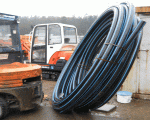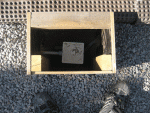Hi!
I am a little peplexed why I haven't seen any of the builds presented here using a hose underground instead of the stiff plastic tubes with numerous of joints hidden underground. From my way of seeing it a hose with radious cornes and with no joints should be a better option.
BUT!! I am very much aware of how far ahead of us you are when it comes to poolbuilds, so there must be an advantage that I have overlooked. I just can't figuring it out.
I know that many of your builds have more compicated plumbings with spas and all the extras that you normally doesen't stumble across here. but you can join together this hoose aswell and those joints would I prefer underground in comparison to a glued one.
I don't belive money is what is all about. The extra cost must be small compared to the many $$$ spent on the whole project.
I thought it perhaps had something to do with that you want a nice and tidy asssembly on the equipment pad but that is easy achived since you can go from the hose to the tubes just above the ground in order to achive that.
Personally I will go from the stiff hose to a more flexible one in my machine room.
I attach a picture of what hose we use over here. That wont break or leak no matter what, it is the same sort that goes into every house with the freshwater supply. Personally I feel confident to cover that hose with concrete.
//Mats
[attachment=0:3gemehhu]PEMpem tube.gif[/attachment:3gemehhu]
I am a little peplexed why I haven't seen any of the builds presented here using a hose underground instead of the stiff plastic tubes with numerous of joints hidden underground. From my way of seeing it a hose with radious cornes and with no joints should be a better option.
BUT!! I am very much aware of how far ahead of us you are when it comes to poolbuilds, so there must be an advantage that I have overlooked. I just can't figuring it out.
I know that many of your builds have more compicated plumbings with spas and all the extras that you normally doesen't stumble across here. but you can join together this hoose aswell and those joints would I prefer underground in comparison to a glued one.
I don't belive money is what is all about. The extra cost must be small compared to the many $$$ spent on the whole project.
I thought it perhaps had something to do with that you want a nice and tidy asssembly on the equipment pad but that is easy achived since you can go from the hose to the tubes just above the ground in order to achive that.
Personally I will go from the stiff hose to a more flexible one in my machine room.
I attach a picture of what hose we use over here. That wont break or leak no matter what, it is the same sort that goes into every house with the freshwater supply. Personally I feel confident to cover that hose with concrete.
//Mats
[attachment=0:3gemehhu]PEMpem tube.gif[/attachment:3gemehhu]



